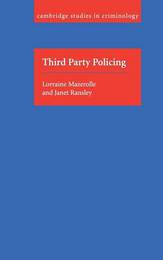
|
Third Party Policing
Hardback
Main Details
| Title |
Third Party Policing
|
| Authors and Contributors |
By (author) Lorraine Mazerolle
|
|
By (author) Janet Ransley
|
| Series | Cambridge Studies in Criminology |
|---|
| Physical Properties |
| Format:Hardback | | Pages:274 | | Dimensions(mm): Height 235,Width 160 |
|
| ISBN/Barcode |
9780521827836
|
| Classifications | Dewey:364 364 |
|---|
| Audience | | Professional & Vocational | |
|---|
| Illustrations |
23 Tables, unspecified
|
|
Publishing Details |
| Publisher |
Cambridge University Press
|
| Imprint |
Cambridge University Press
|
| Publication Date |
6 February 2006 |
| Publication Country |
United Kingdom
|
Description
This book is the first comprehensive exploration of a major change in crime control whereby responsibility no longer rests primarily with state agencies, but is shared with a wide range of organisations and individuals. As a result the role of the state has been described as increasingly regulatory rather than actually controlling policing and criminal justice functions. Exactly how third party policing works, practical issues and ethical implications, are all integrated with original research and theory to provide a valuable resource for students, academics and policy makers.
Author Biography
Lorraine Mazerolle is an Associate Professor in the Department of Criminology and Criminal Justice at Griffith University. She is the author of Policing Places with Drug Problems (1999) and co-editor, with Jan Roehl, of Civil Remedies and Crime Prevention (1998). Janet Ransley is a senior lecturer in the School of Criminology and Criminal Justice, Griffith University. She has worked extensively in legal practice, and in providing research and policy advice for parliamentary and government agencies in Australia. Dr Ransley is the co-editor, with Tim Prenzler, of Police Reform: Building Integrity (2003).
Reviews'The important contribution of this book is that it defines and outlines the dimensions of strategies for crime prevention and control that fall between formal policing and citizen responsibility as well as provides an evaluation of current and past third party policing efforts. This is important because it enables researchers and practitioners not only to have a common language by which to refer to this activity, but also specific guidance for practice.' Policing: An International Journal of Police Strategies & Management
|